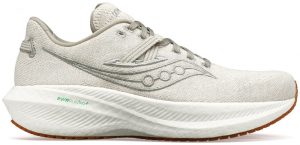 Saucony’s Triumph RFG running shoe features a cotton upper and 55-percent Susterra® propanediol mid-sole for a more sustainable performance product.
Saucony’s Triumph RFG running shoe features a cotton upper and 55-percent Susterra® propanediol mid-sole for a more sustainable performance product.
By Rachael S. Davis, Executive Editor
Performance running shoes almost exclusively have been produced using man-made materials because performance — including flexibility, cushioning, breathability and stability — as well as durability are specifications that are easily met with synthetic materials.
But when such performance shoes reach the end of their useful lives, they are not very environmentally friendly and are typically difficult to recycle. There are roughly 22 billion pairs of footwear manufactured each year according to various sources, with the U.S. Department of the Interior reporting as many as 300 million pairs of shoes each year are discarded into landfills where they can take 30 to 40 years to decompose.
Lexington, Mass.-based brand Saucony®— a division of Wolverine World Wide Inc. — recently published sustainability goals that aim to have 90 percent of its production contain organic, recycled or renewable materials by the year 2025, ramping up to 100 percent by 2030. With these goals in mind, the brand developed its Triumph RFG (Run For Good) performance shoe — its most sustainable running shoe to date — using sustainable materials throughout its construction.
The shoe features a mesh cotton upper that is dyed using plant-based dyes. These dyes result in light, neutral colors for the running shoes.
To produce the mid-sole, Saucony collaborated with CovationBio PDO™, producer of biobased Susterra® propanediol, to produce the shoe’s PWRRUN BIO+® midsole foam. The foam is made using 55-percent Susterra, a regeneratively grown dent-corn-based 1,3 propanediol, which is petroleum-free. According to CovationBio, Susterra generates
“48-percent less greenhouse gas emissions cradle-to-gate compared to 1,4-butanediol (BDO), a common petrochemical-sourced alternative,” thus reducing dependency on fossil fuels.
In addition, Saucony engineered a material for the outsole featuring 80-percent rubber, which Saucony reports performs just as well as a man-made material but is more sustainable.
“At Saucony, we say that when we innovate, we elevate — the industry, our partners and the sport,” said Rob Griffiths, Saucony global brand president. “But quite simply, the future of our sport depends on the future of our planet, and we know we can do better for ourselves and the earth. There’s no one-size-fits-all solution. That means as a member of the global community, it is imperative that we are constantly innovating, researching, and committing to our promise to find more sustainable options. We believe there is no finish line when it comes to sustainability; we are dedicated to pushing ourselves and the industry to do better.”
“We are proud to be a part of Saucony’s sustainable mission, and this marks a milestone for Susterra propanediol,” said John Hurban, vice president of global marketing and sales at CovationBio PDO. “It’s the first example we’re aware of where this percentage of bio-based content is used in the midsole of an athletic shoe. We believe runners and fitness enthusiasts will benefit from increased high-performance shoe flexibility, comfortability, and durability. This shoe sizes up against the competition and goes the distance to have a lighter environmental footprint.”
For more information about Saucony’s Triumph RFG shoe, visit saucony.com; and for more informa-tion about Susterra®, visit susterra-performs.com
January/February 2024




